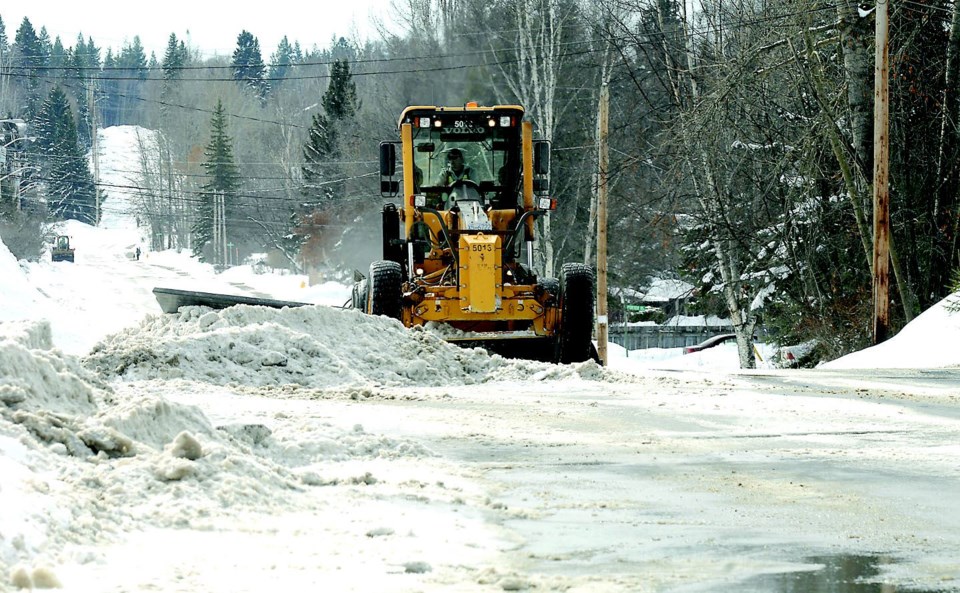The city's response to its snow clearing operations this past winter were "embarrassing," according to a city councillor.
The city contracted the services of Maryland-based consultants Mercury Associates for a $131,900 review of Prince George's snow and ice removal and fleet operations.
That's a cost that didn't need to be paid, said Coun. Brian Skakun, following an overview of Mercury's comprehensive report by company president Paul Lauria at Monday night's council meeting.
"That's why we pay our senior management - to manage the city in an effective and safe manner and in my opinion the snow removal program was turned into a train wreck," said Skakun. "It was a perfect storm where everything happened last winter."
The initial discussion on snow removal has morphed into something greater, said Coun. Lyn Hall.
"We're looking at a myriad of things I never anticipated having to look at because of what happened last winter," he said, but acknowledged there were elements of the report that the city was aware of beforehand.
As part of the implementation plan approved by council this week, there will be upwards of $485,000 in capital and operating costs to make recommendations from Mercury a reality.
That money would cover things such as installing signs to indicate the snow routes (the specifics of which will return to council at a later date), the annual costs of a peer-training program and subscribing to a weather forecast for a snow season, installing two additional weather stations and purchasing a GPS system for the heavy and light duty fleet.
Costs yet to be determined include the city's new system for contracting rental equipment. Two contracts are currently out to tender for equipment to clear the city's downtown parkades and open parking lots.
According to the bid documents, both contracts are for three year terms with the option to extend them for an extra year.
The city is asking for the successful bidder to provide snow clearing, removal and sanding after 2 a.m. on weekdays, if snow accumulates to more than 10 centimetres or if there is a sudden thaw and freeze resulting in more than 10 centimetres of slush or ice build up.
On weekends and holidays, the snow must be cleared before 7 a.m. on the next business day.
"One of the reasons you have ineffective equipment sourcing practices is, again, you don't know what you need," Lauria told council. "You haven't taken the time to capture the data and analyze the data to quantify what you need where and when and what the consequences are of not having it. If you had done all those things, believe me, you would have effective supplier agreements (and) we wouldn't be talking about a special RFP to go out and establish a new retainer agreement."
The city is also working to get its hands on a proper fleet management information system for $150,000 to have up and running next year and staff are still working on a recommendation to look at contracting equipment not only by lowest price, but by the age of the equipment.
A request for proposal has also been issued for a GPS system for the city's heavy duty fleet and some of the light duty vehicles.
Among the program requirements for potential contractors include a system that could track operating systems such as salt and spreader controllers, hoist sensors, aerial bucket sensor and solid waste container arms on garbage trucks. The system would also require a public element so that residents can see the progress of certain vehicles and information.
Administration's implementation plan groups recommendations into items that will be tackled immediately before winter, within six months, within a year, and beyond the next 12 months.
One of the major challenges still facing the city is how to dig itself out of the hole it's in while still managing the daily operations, said Lauria.
"These things are not all going to be fixed in 18 months. Anybody who thinks that, they are being unrealistic. If you could largely fix everything in 36 months that would be quite an accomplishment," he said. "What we're really talking about is how do you go from being largely reactive - responding to the next storm, the next demand, the next request - to being proactive. And it's easy to talk about, it's easy to write about; it's hard to actually do in the real world because everybody has their day job that they have to do."


